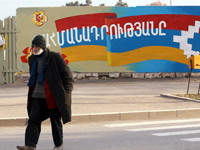Registration
Thank you!
You will receive an email confirming your registration.
IMGXYZ3250IMGZYXFollowing the failure to reach a breakthrough at the June 2011 summit in Kazan, formal negotiations between political leaders in Armenia and Azerbaijan over the Nagorny Karabakh conflict are again deadlocked. Carnegie hosted a roundtable discussion with non-governmental experts on ways of strengthening and improving non-governmental dialogue between Armenians and Azerbaijanis. The discussion was initiated by Philip Gamaghelyan from George Mason University, independent analyst Tabib Huseynov, and Carnegie’s Thomas de Waal. Professor Susan Allen Nan from George Mason University moderated.
A Developing Dialogue
- Entrenched Positions: Both sides have done little to curb the rise of hardline attitudes towards reconciliation, Gamaghelyan noted. De Waal said that while talking about compromise in private, in public political leaders in Yerevan and Baku resort to nationalist rhetoric in order to appease their constituencies. Although they are neighbors, it is as though “Armenians are from Mars and Azerbaijanis are from Jupiter,” added de Waal. While Armenian civil society generally says that it supports confidence-building measures (CBMs), Huseynov argued that Azerbaijani civil society sometimes fears that CBMs might entrench the status quo in favor of Armenia and is often reluctant to take part unless there is a constructive agenda for changing the status quo.
- Developing Track II: Gamaghelyan called for more civil society engagement in coordination with formal Track I negotiations. Both sides should tackle divisive issues and develop a common vision for conflict resolution at the grassroots level, Huseynov stressed. De Waal added that Track II should support and reward local reconciliation initiatives, such as the successful village swap between ordinary Armenians and Azerbaijanis in 1989, and highlight a narrative of human compassion underneath the pervasive nationalist discourse in both countries.
- A More Inclusive Dialogue: Several contributors pointed out that Karabakh Armenians and Azerbaijanis are completely absent from Track I negotiations, even though the conflict has directly impacted their lives. There was some disagreement about whether the Karabakh Armenians were a party to the conflict or, as some Azerbaijanis said, a “community” on par with Karabakh Azerbaijanis. Several speakers argued that it was a mistake to focus on formats in this way and that anyone with a stake in a specific issue related to the conflict should be invited to join a conversation on that issue.
Moving Beyond the Status Quo
- Normalization: Given the current deadlock over the political status of Nagorny Karabakh, attention should shift to “conflict transformation,” argued Richard Giragosian, a Yerevan-based analyst. All sides must work to “normalize the abnormal” and declare the status quo unacceptable. Turkish-Armenian reconciliation could change the dynamics of the Nagorny Karabakh peace process in a positive way, he added.
- Track II Goals: Track II dialogue should not imitate the stalled Track I negotiations, which often entail contentious debates over terminology and political status, argued Taleh Ziyadov, a PhD candidate at the University of Cambridge.
- Substantive Issues: Marine Manucharyan from Civic Forum recommended leaving divisive issues out of Track II diplomacy because both societies are not ready to tackle these problems. Instead, Track II efforts should focus on substantive issues that impact people’s daily lives.
- Displaced Persons: Ziyadov suggested that the partial return of the estimated 600,000 Azerbaijani internally-displaced persons (IDPs) to districts surrounding Nagorny Karabakh could help break the current stalemate. Civil society initiatives could also help establish useful contacts that would eventually feed into Track I negotiations, he added.
- Wider Civil Society: Carnegie’s James F. Collins warned that the outside world was getting tired of the Karabakh conflict and it was getting harder to attract attention to the peace process. He encouraged participants to broaden their understanding of civil society to include businesses and religious organizations.
- Substantive Issues: Marine Manucharyan from Civic Forum recommended leaving divisive issues out of Track II diplomacy because both societies are not ready to tackle these problems. Instead, Track II efforts should focus on substantive issues that impact people’s daily lives.
- Transparency: Several participants underlined the importance of maintaining transparency and visibility in any Track II dialogue. Giragosian warned that “the lack of information tends to promote misinformation.” The current discussion is a testament to a desire for openness, he added.
Obstacles
- Politicization: The Armenian-Azerbaijan peace process cannot escape politics, argued Tamar Palandjian from the Imagine Center for Conflict Transformation. Since even city names and terminology can generate political controversy, a more inclusive vocabulary, such as using two names for a city, could reduce tensions, she added. Huseynov argued that Track II is often politicized and used by both sides as a tool to promote their political agendas.
- Public Context: As previous dialogues have shown, engaging top government officials is often challenging, noted former U.S. Ambassador Harold Saunders. De Waal emphasized that changing the public context is difficult when politicians control both the narrative and the media. In the context of Armenian-Azerbaijani reconciliation, only a movement from below would have the potential to change attitudes at the top. He compared such a scenario to Northern Ireland, where society was a step ahead of the political parties in its efforts to end conflict in the 1990s.
- The “Other”: In his opening remarks, Gamaghelyan noted that mutual dehumanization remains a serious problem. Irina Ghaplanyan from the University of Cambridge emphasized the need to develop a moderate narrative that incorporates Armenian and Azerbaijani perspectives in order to rise above nationalist discourse. Such rhetoric has unfortunately spread to social media, noted Arzu Geybullayeva from Imagine Center. Ziyadov pointed out that Azerbaijan’s younger generation has little to no experience living with Armenians and highlighted the importance of inter-community dialogue.
